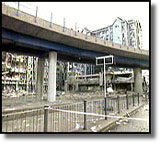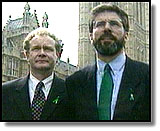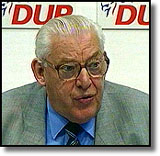
|
"Peace Train" TimetableSinn Fein's journey to the negotiating table has been long and arduous. Few could have predicted when the last ceasefire broke down that republicans would be at Stormont just eight weeks after its restoration.August 1994 - IRA announces "complete cessation" of violence from midnight. October - Combined Loyalist Military Command announces ceasefire. John Major promises exploratory talks with Sinn Fein before the year is out. Those begin in December but flounder in early 1995. January 1996 - International commission led by US Senator George Mitchell proposes all-party talks alongside phased surrender of terrorist weapons. February - A massive bomb in London's Docklands signals the end of the IRA ceasefire. Two people are killed and 100 injured. The IRA claims the Government dragged its feet on setting a date for all-party talks.
June 10 - Sinn Fein is excluded from inter-party talks at Stormont and four days later boycotts the first meeting of the Forum. July - Widespread violence erupts across the Province after the Drumcree Orange parade is forced down the nationalist Garvaghy Road in Portadown. October - The Stormont talks move forward slightly with discussions on decommissioning. December - John Major rejects the "Hume-Adams" proposals for a new IRA ceasefire. January 1997 - Irish government severs official contact with Sinn Fein. The move is thought to have been sparked by an IRA shooting attempt in a Belfast children's hospital before Christmas. The Stormont talks are suspended after deadlock on arms decommissioning.
May 16 - In a major speech in the Province newly-elected Tony Blair says his officials will hold exploratory talks with Sinn Fein who accept the offer. It is later revealed this contact continued despite the IRA's murder of two policemen in Lurgan. July 6
August 26 - Anglo-Irish International decommissioning body set up to oversee the handover of weapons. But unionists complain bitterly that this will have no power to make terrorists give up their arms. August 28 - Mo Mowlam poised to announce the IRA ceasefire has been sufficiently well observed for Sinn Fein to enter talks on September 15. Sinn Fein's chief negotiator Martin McGuinness predicts a meeting with Tony Blair "within weeks".
|
Diana, Princess of Wales, 1961-1997
Conference 97
Devolution
The Archive
News |
Issues |
Background |
Parties |
Analysis |
TV/Radio/Web
Interactive |
Forum |
Live |
About This Site
News |
Issues |
Background |
Parties |
Analysis |
TV/Radio/Web
Interactive |
Forum |
Live |
About This Site
© BBC 1997 |
politics97@bbc.co.uk |



